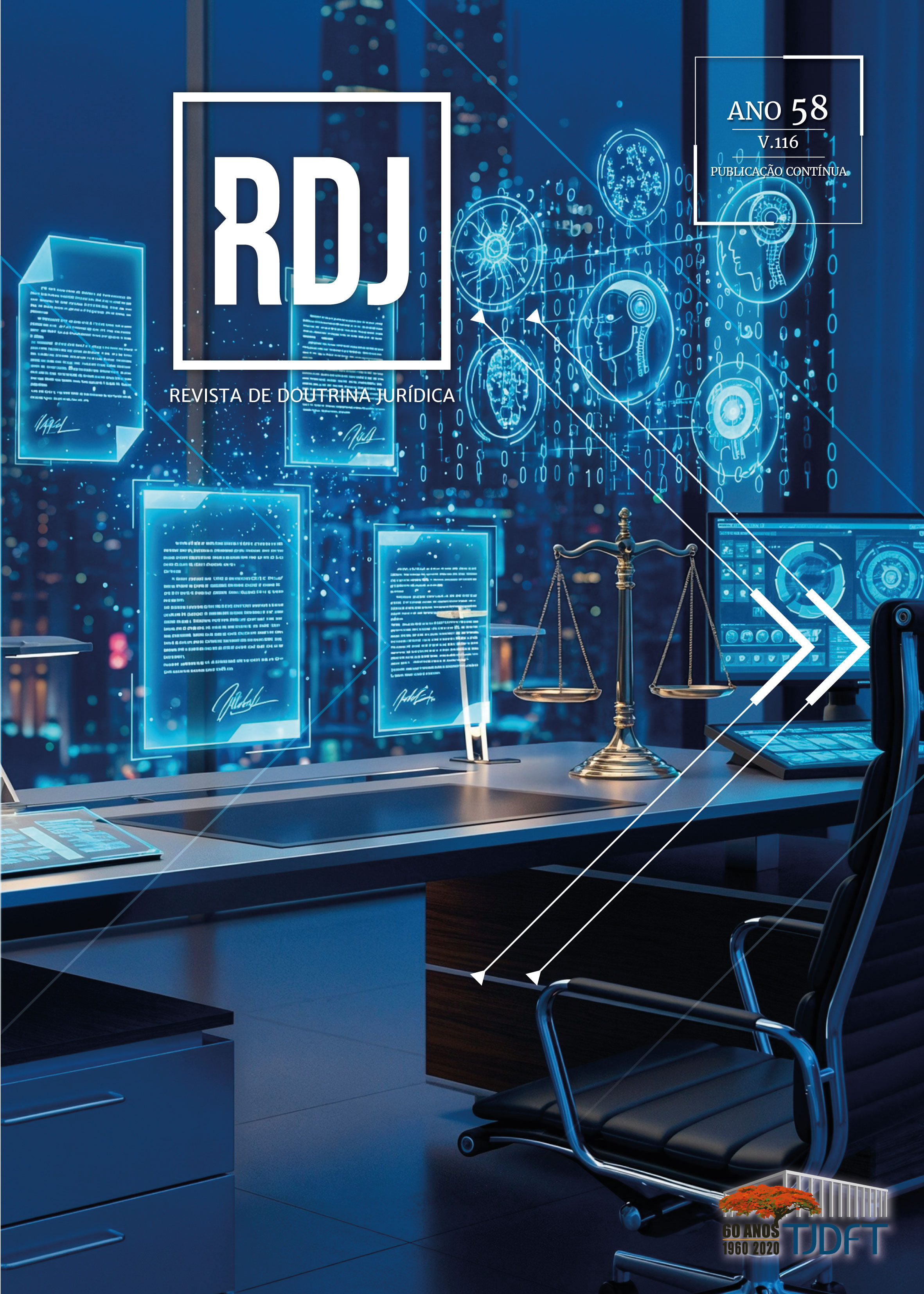the RESPONSIBLE USE OF ARTIFICIAL INTELLIGENCE: REFLECTIONS ON TECHNOLOGY, SOCIETY, AND ETHICS
reflexões sobre tecnologia, sociedade e ética
DOI:
https://doi.org/10.64544/rdj.v116i00.1031Keywords:
Inteligência artificial. Uso responsável. Direitos humanos. Governança global. Segurança pública.Abstract
The article explores how the public and private sectors have addressed the regulation of responsible use of Artificial Intelligence (AI) amid the absence of specific legislation. Through exploratory bibliographic research, which includes the analysis of websites, governmental and corporate documents, academic articles, and reports from international organizations, the study aims to understand how the responsible use of AI is being structured. Initially, the concept of responsible use is analyzed, focusing on its three pillars: fundamental principles, ethics, and the safeguarding of human rights. Subsequently, the approach of the private sector is examined, highlighting the importance of self-regulation and social responsibility. A significant point is the analysis of UNESCO's recommendation on the ethical use of AI, a document unanimously endorsed by 193 member states, representing a milestone for global technology governance. Furthermore, recent guidelines for the public sector in security are discussed, exemplified by Interpol's "AI Toolkit." It concludes that, although it is urgent and necessary to establish a mandatory regulatory framework with coercive mechanisms, the individual initiatives of different actors are contributing to the formation of an emerging global governance, ensuring that technological innovation advances while respecting human rights.
References
AGÊNCIA SENADO. Senado aprova regulamentação da inteligência artificial; texto vai à Câmara. Site Senado Federal, Brasília, 10 dez. 2024. Disponível em: https://www12.senado.leg.br/noticias/materias/2024/12/10/senado-aprova-regulamentacao-da-inteligencia-artificial-texto-vai-a-camara. Acesso em: 27 mar. 2025.
ASSOCIAÇÃO NACIONAL DE JORNAIS. Documento da Unesco reúne padrões globais sobre a ética da Inteligência Artificial. Site ANJ, Brasília, 15 set. 2022. Disponível em: https://www.anj.org.br/documento-da-unesco-reune-padroes-globais-sobre-a-etica-da-inteligencia-artificial/#:~:text=A%20Recomenda%C3%A7%C3%A3o%2C%20aprovada%20na%2041%C2%AA. Acesso em: 5 fev. 2024.
BARREA, Adriana; CASTANHEIRO, Ivan Carneiro. Inteligência artificial explicável: transparência e responsabilidade. Estadão, São Paulo, 18 jan. 2024. Disponível em: https://www.estadao.com.br/politica/blog-do-fausto-macedo/inteligencia-artificial-explicavel-transparencia-e-responsabilidade/. Acesso em: 2 fev. 2024.
BARREA, Adriana; SALMORIA, Camila Henning; RODRIGUES, Francisco Luciano Lima. Inteligência artificial - IA: reflexões sobre sua utilização pelo poder judiciário. Revista Judicial Brasileira, Brasília, v. 3, p. 329-361, 2023. Disponível em: https://revistadaenfam.emnuvens.com.br/renfam/article/view/229/79. Acesso em: 5 fev. 2024.
BRASIL. Ministério da Ciência, Tecnologia e Inovações Secretaria de Empreendedorismo e Inovação. Estratégia brasileira de inteligência artificial - EBIA. Brasília: MCTI, 2021. 51 p. Disponível em: https://www.gov.br/mcti/pt-br/acompanhe-o-mcti/transformacaodigital/arquivosinteligenciaartificial/ebia-documento_referencia_4-979_2021.pdf. Acesso em: 27 mar. 2025.
BRASIL. Senado Federal. PROJETO DE LEI Nº 2338 de 2023. Dispõe sobre o uso da Inteligência Artificial. Brasília: Senado Federal, 2023. Disponível em: https://legis.senado.leg.br/sdleg-getter/documento?dm=9347593&ts=1742240889254&disposition=inline. Acesso em: 23 set. 2024.
CAMILLERI, Mark Anthony. Artificial intelligence governance: ethical considerations and implications for social responsibility. Expert Systems, [s. l.], v. 41, n. 7, p. 1-15, jul. 2024. Disponível em: https://onlinelibrary.wiley.com/doi/full/10.1111/exsy.13406. Acesso em: 2 fev. 2024.
FERRAREZI, Thiago. Parlamento Europeu adota posição para regulamentar a Inteligência Artificial e promover sua confiabilidade e proteção dos direitos fundamentais. Site Migalhas, [s. l.], 6 jul. 2023. Disponível em: https://www.migalhas.com.br/depeso/389455/parlamento-europeu-adota-posicao-para-regulamentar-a-ia. Acesso em: 2 fev. 2024.
IA RESPONSÁVEL. Recomendações da Interpol sobre IA na segurança pública. Site IA Responsável, [s. l.], 2023. Disponível em: https://www.iaresponsavel.com.br/2023/11/13/recomendacoes-da-interpol-sobre-inteligencia-artificial-na-seguranca-publica/. Acesso em: 2 fev. 2024.
INTERPOL. Readme file. Site UNICRI, [s. l.], 2023. Disponível em: https://unicri.it/sites/default/files/2023-06/00_README%20File.pdf. Acesso em: 2 fev. 2024.
KAUFMAN, Dora. Desmistificando a inteligência artificial. Belo Horizonte: Autêntica, 2022. 336p.
LARSSON, Stefan; HEINTZ, Fredrik. Transparency in artificial intelligence. Internet Policy Review, Berlin, v. 9, n. 2, p. 1-16, 2020. Disponível em: https://policyreview.info/concepts/transparency-artificial-intelligence. Acesso em: 2 fev. 2024.
MICROSOFT. Microsoft responsible AI standard, v2 general requirements for external release. Site GitHub, [s. l.], 2022. Disponível em: https://github.com/microsoft/chat-copilot/blob/main/tools/importdocument/sample-docs/Microsoft-Responsible-AI-Standard-v2-General-Requirements.pdf. Acesso em: 2 fev. 2024.
NAHRA, Kirk J. et al. European parliament adopts negotiating position on the AI act. WilmerHale [s. l.], 15 jun. 2023. Disponível em: https://www.wilmerhale.com/en/insights/blogs/wilmerhale-privacy-and-cybersecurity-law/20230615-european-parliament-adopts-negotiating-position-on-the-ai-act. Acesso em: 2 fev. 2024.
POLIDO, Fabrício Bertini Pasquot. Inteligência artificial entre estratégias nacionais e a corrida regulatória global: rotas analíticas para uma releitura internacionalista e comparada. Revista da Faculdade de Direito da Universidade Federal de Minas Gerais, Belo Horizonte, n. 76, p. 229-256, jan./jun. 2020. Disponível em: https://revista.direito.ufmg.br/index.php/revista/article/view/2067. Acesso em: 2 fev. 2024.
SAS. Empresas buscam uso responsável da Inteligência Artificial. Site SAS, [s. l.], 2024. Disponível em: https://www.sas.com/pt_br/insights/articles/analytics/empresas-buscam-uso-responsavel-da-inteligencia-artificial. html. Acesso em: 2 fev. 2024.
UNESCO. Ethical impact assessment: a tool of the recommendation on the ethics of artificial intelligence. Site UNESCO, [s. l.], 2023. Disponível em: https://unesdoc.unesco.org/ark:/48223/pf0000386276. Acesso em: 2 fev. 2024.
UNESCO. Ethics of artificial intelligence. Site UNESCO, [s. l.], 2021. Disponível em: https://www.unesco.org/en/artificial-intelligence/recommendation-ethics. Acesso em: 2 fev. 2024.
WANG, Yichuan; XIONG, Mengran; OLYA, Hossein. Toward an understanding of responsible artificial intelligence practices. In: BUI, Tung X. Proceedings of the 53rd Hawaii International Conference on System Sciences. Hawaii: HICSS, 2020. p. 4962-4971.
Downloads
Published
How to Cite
Issue
Section
License
Copyright (c) 2025 Camila Henning Salmoria, Adriana Barrea

This work is licensed under a Creative Commons Attribution 4.0 International License.
O(s) autor declara(m) que o trabalho é original e inédito, não tendo sido submetido à publicação em qualquer meio de divulgação, especialmente em outro periódico, nacional ou internacional, quer seja em parte ou na íntegra;
Caso aprovada e selecionada, fica autorizada a publicação da produção na Revista de Doutrina Jurídica – RDJ, a qual não se responsabiliza pelas opiniões, ideias e conceitos emitidos nos textos, por serem de inteira responsabilidade de seu(s) autor(es);
A publicação do artigo implica transferência gratuita dos direitos autorais à Revista, nas versões eletrônica e impressa, conforme permissivo constante do artigo 49 da Lei de Proteção de Direitos Autorais (Lei 9.610, de 19/02/98), e que a não observância desse compromisso submeterá o infrator a sanções e penas previstas no mesmo diploma legal;
Todos os artigos publicados são licenciados sob a Licença Creative Commons Attribution, que permite o compartilhamento do trabalho com reconhecimento da autoria e publicação inicial nesta revista.




